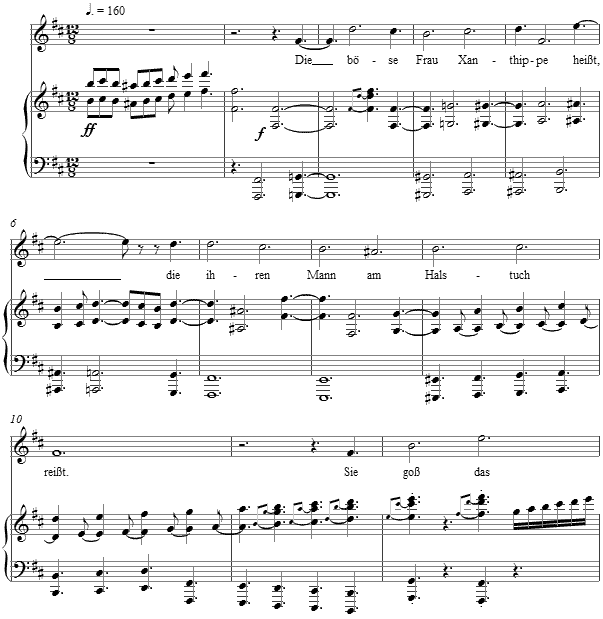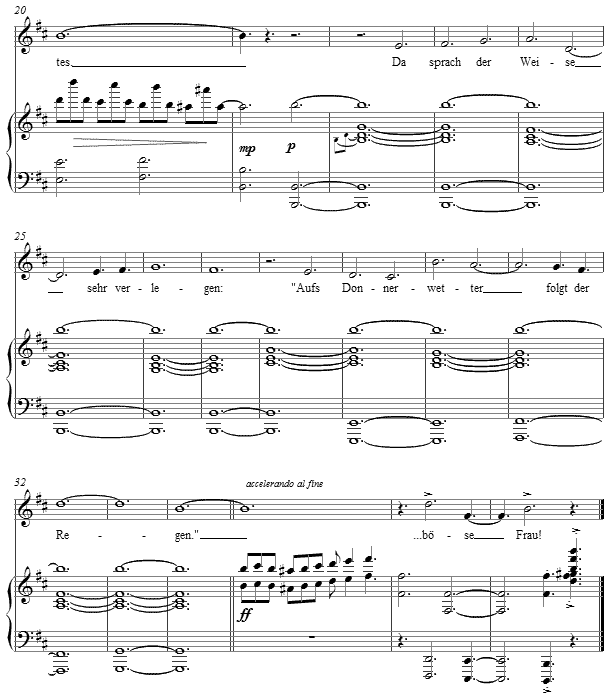Music and Texts of GARY BACHLUND
Vocal Music | Piano | Organ | Chamber Music | Orchestral | Articles and Commentary | Poems and Stories | Miscellany | FAQs
Xanthippe - (2008)
Frank Wedekind
for medium voice and piano
Die böse Frau Xanthippe heißt,
Die ihren Mann am Halstuch reißt.
Sie goß das volle Nachtgefäß
Hinunter über Sokrates.
Da sprach der Weise sehr verlegen:
"Aufs Donnerwetter folgt der Regen."[ 2 pages, circa 55" ]
Frank Wedekind
Frank Wedekind was born in Hanover in 1864. He was forced to study law, though his natural inclination was for writing, which he found time at an early age to do. In Zurich, where he later continued his studies, he came into contact with the "Moderns," among them Hauptmann and Strindberg. In 1888, after the death of his father, Wedekind went to Munich, and thence visited London, Paris, and all the centers of European culture, all the sinks of its perversity and crookedness. He squandered his money and his beliefs recklessly. In 1891 he returned again to Munich. A few years later he was imprisoned for lèse majesté, was soon released and became a vaudeville performer, then acted in his own plays, and eventually settled in Munich, after his marriage in 1908. He would remain there until his death in 1918.
Wedekind is of no school, he recognizes no established laws, he sets at defiance morality and accepted belief; some of his plays contain scenes that "would sicken a police reporter," while the most innocuous often contain scenes that are sickeningly brutal. Yet withal, he is a genius -- if by that term we mean one who has the art of presenting life and character, of creating illusion, one capable at times of producing a thing of power and beauty. If this is granted, then Wedekind is an exceptional genius. His unparalleled audacity, his reckless iconoclasm, his absolute disregard for accepted forms in art, cannot fail to command respect.
Originally published in The Continental Drama of Today. Barrett H. Clark. New York: Henry Holt and Company, 1914. pp. 115-6.
She's called the grouchy Missus Xanthippe,
that yanked her husband around by his neckerchief.
She dumped a whole chamber pot
All over Socrates.
Then did the wise one opine:
"After thunder comes the rain."
In Xenophon's Symposium Socrates agree that his wife, Xanthippe, was (in Antisthenes' words) "the hardest to get along with of all the women there are" [2.10]. For this, she comes down in history as a model of the shrew. A well known anecdote about the angry Xanthippe is the one where she was so angry with her husband that she threw a bucket of washing water on him. The philosopher then replied: after thunder comes rain. Socrates' saying "Marry or marry not, in any case you'll regret it" was supposedly in contemplation of his wife. Wedekind's contribution to the image of Xanthippe is to exchanged the "wash water" for the night's contents of a chamber pot. No doubt then that this setting is an aggressive one.
In contrast to the seeming rage of the shrewish wife, the "long suffering" of the husband is captured by a long-lined gesture, the B pedal in the top voice never leaving its place of seeming rest. The setting ends with an aggressive reminder of the opening.
The score for Xanthippe is available as a free PDF download, though any major commercial performance or recording of the work is prohibited without prior arrangement with the composer. Click on the graphic below for this piano-vocal score.



